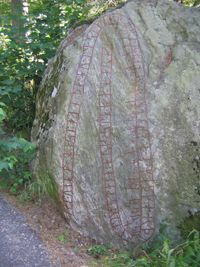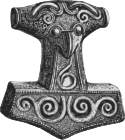Midgard
Midgard (an Anglicised[1] form of Old Norse Miðgarðr),is one of the Nine Worlds and is an old Germanic name for our world and is the home of Humans, with the literal meaning "middle enclosure".
Contents |
Etymology
This name is attested in many ancient Germanic languages. It occurs in Old Norse literature as Miðgarðr. In Old High German poem Muspilli it appears as Mittilagart. The Gothic form Midjungards is attested in Luke's Gospel as a translation of the word "earth". The word is present in Old English epic and poetry as Middangeard; later transformed to Middellærd or Mittelerde ("Middle-earth") in Middle English literature. "Middle-earth" is usually avoided in modern English, as it has strong associations with J.R.R. Tolkien's fantastic "legendarium".
All these forms are from a conjectural Proto-Germanic *medja-gardaz (*meddila-, *medjan-). Even if the two terms derive from Indo-European roots *medhyo ("middle") and *ghartos ("enclosure"), the construct exists only in Germanic. It's possible to speculate about the ancientness of this cosmological concept, but it may be inappropriate to trace back the Germanic terminology in common Indo-European.
The Danish and Swedish form Midgård' or Midgaard, the Norwegian Midgard or Midgård, as well as the Icelandic form Miðgarður, all derive from the Old Norse term.
Old Norse
Midgard is a realm in Norse mythology. Pictured as placed somewhere in the middle of Yggdrasil, Midgard is surrounded by a world of water, or ocean, that is impassable. The ocean is inhabited by the great sea serpent Jörmungandr (Miðgarðsormr), who is so huge that he encircles the world entirely, grasping his own tail. The concept is similar to that of the Ouroboros.
In Norse mythology, Miðgarðr became applied to the wall around the world that the gods constructed from the eyebrows of the giant Ymir as a defence against the Jotuns who lived in Jotunheim, west of Mannheim, "the home of men," a word used to refer to the entire world (there is no direct relation to the German city of Mannheim, which is attested from the 8th century, named after an early settler called Manno).
The realm was said to have been formed from the flesh and blood of Ymir, his flesh constituting the land and his blood the oceans, and was connected to Asgard by the Bifrost Bridge, guarded by Heimdall.

According to the Eddas, Midgard will be destroyed at Ragnarök, the battle at the end of the world. Jörmungandr will arise from the ocean, poisoning the land and sea with his venom and causing the sea to rear up and lash against the land. The final battle will take place on the plain of Vígríðr, following which Midgard and almost all life on it will be destroyed, with the earth sinking into the sea.
Although most surviving instances of the word refer to spiritual matters, it was also used in more mundane situations, as in the Viking Age runestone poem Sö 56:
|
|
Old and Middle English
The name middangeard occurs half a dozen times in the Anglo-Saxon epic poem Beowulf, and is the same word as Midgard in Old Norse. The term is equivalent in meaning to the Greek term Oikoumene, as referring to the known and inhabited world.
The concept of Midgard occurs many times in Middle English. The association with earth (OE eorðe) in Middle English middellærd, middelerde is by popular etymology; the continuation of geard "enclosure" is yard. An early example of this transformation is from the Ormulum:
-
- þatt ure Drihhtin wollde / ben borenn i þiss middellærd
-
- that our Lord wanted / be born in this middle-earth.
The usage of "Middle-earth" as a name for a setting was popularized by Old English scholar J. R. R. Tolkien in his The Lord of the Rings and other fantasy works; he was originally inspired by the references to middangeard and Éarendel in the Old English poem Crist.
Old High German
Mittilagart is mentioned in the 9th century Old High German Muspilli (v. 54) meaning "the world" as opposed to the sea and the heavens:
-
- muor varsuuilhit sih, suilizot lougiu der himil,
- mano uallit, prinnit mittilagart
-
- Sea is swallowed, flaming burn the heavens,
- Moon falls, Midgard burns
In Literature, Games, and other Media Today
- In The Mighty Thor comics published by Marvel Comics based on Norse mythology, Earth is frequently referred to as Midgard.
- In the massively multiplayer online role-playing game Dark Age of Camelot, Midgard refers to the ancient Norway as the realm of the Viking, just after the time of Arthur's death in Albion. Along with Albion and Hibernia it is one of three realms at war with one another which player characters can choose to originate from.
- The role-playing game Final Fantasy VII for the PlayStation features Midgar, a divided city where the human population inhabits different enclosed sections all meeting at a central hub, which is clearly a nod to the Norse mythos. Another city is Nibelheim, apparently taken from the Norse realm of Niflheim. At the nearby swamp resides the Midgar Zolom, a giant serpent, referencing Midgardsormr, the Midgard Serpent. When transcribed into Japanese kana syllabary, Sormr (スオルム suorumu) and Zolom (ゾロム zoromu) are very similar in pronunciation.
- In Too Human, Midgard is the only surviving human city, in which the humans survive under the protection of the Aesir, and Odin.
- In the massively multiplayer online role-playing game Ragnarok Online, Rune 'Midgard' is the main setting of the game. Also, Niflheim is a realm full of undead beasts, only accessible through the Yggdrasil tree.
- In Tomb Raider: Underworld (2008), the fictional Archealogist/Adventurer Lara Croft travels to Niflheim, Helheim and Yggdrasil, and it is depicted that the Midgard Serpent is referring to the network of tectonic plates that encircle the world at the bottom of the ocean.
- The Tales of... game series frequently references Norse mythology, an example of which is the city of Midgards in Tales of Phantasia. Similarly to the Norse Midgard, Midgards is destroyed in a world-altering event.
- In the television show Stargate SG-1, Earth is known as Midgard by the humans under the protection of the alien race known as the Asgard.
References
- ↑ Online Etymology Dictionary
- ↑ See also Skaldic Poetry of the Scandinavian Middle Ages for a version in normalized Old Norse orthography.
|
||||||||||||||||||||||||||||
|
||||||||||||||||
|
|||||||||||||||||||||||||||||||||
.jpg)


